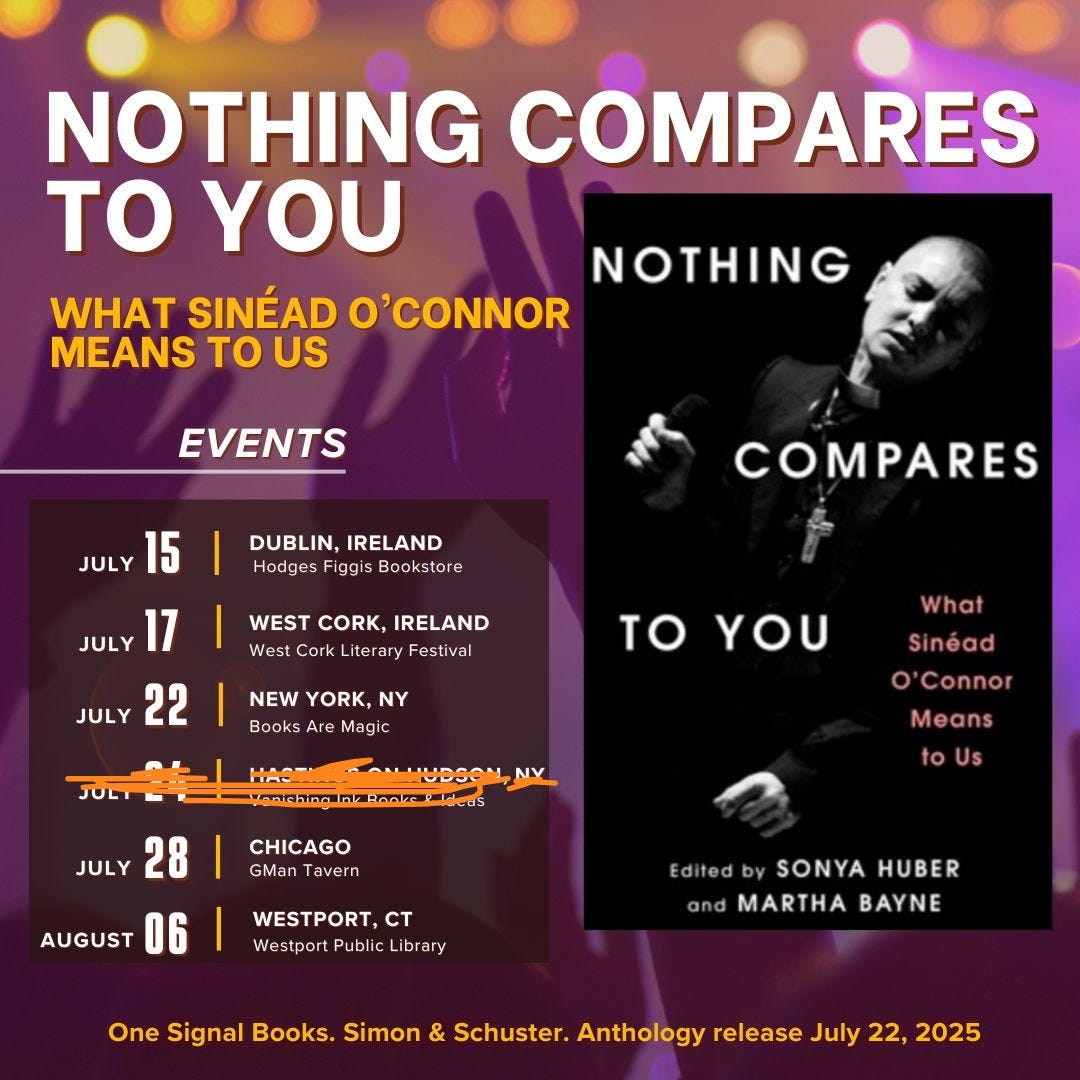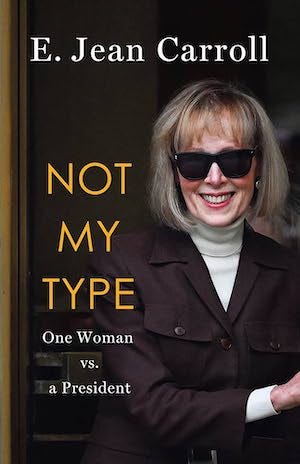Hello!
We are in full-bore promotional mode for NOTHING COMPARES TO YOU: WHAT SINÉAD O’CONNOR MEANS TO US, officially out in the world on July 22. We — coeditor Sonya Huber, myself, and our many brilliant contributors — are celebrating around the globe, or at least back and forth across the Atlantic, with events in Dublin, West Cork, Brooklyn, Chicago, and Connecticut. See above for full sched! And note: Our planned 7/24 event in Hastings-on-Hudson had to be postponed, but we hope to reschedule at a later date.
The runup to a book’s publication is stressful in the best of times — so many details to confirm, so many calendars to align, so many wires to potentially cross — but right now, in these worst of times, it is a new animal entirely. I woke up Tuesday morning with an alligator of anxiety crouched on my chest, tail lashing between between various flavors of pre-publication panic and every-living-moment fury at the powers working to destroy the lives of immigrants, Palestinians, poor people, disabled people, LGBTQ people, and of course women. Always women.
I had been in Seattle for the weekend, visiting family and attending a memorial service, and the panic attack hit as I was getting ready to go to the airport to come home to Chicago. I’ve had them before. In college they became so debilitating that I had to drop out for a time. But I haven’t had one in years, and this one — on a beautiful summer morning in Seattle, surrounded by my family — took me by surprise. I was at a loss, pacing in circles in the yard until my sisters sat me down and told me to hold an ice pack to the back of my neck. It worked, the chill spreading from the top of my spine across my shoulders and creeping up my skull, numbing me out.
Now, numbing out as a stress-management strategy clearly has its downsides. I’ve learned that the hard way over the years. But in moments like this it works to get over the hump — to stop hyperventilating and shaking and get on with the next step which, on Tuesday, was to get to the airport and get on a plane. Once I was there, the next step was obvious: continue reading
’s book.Have you read E. Jean Carroll’s book? I finished it on that plane and my god it is the medicine I need, and you probably do too. Not My Type: One Woman vs. a President is currently climbing the bestseller lists but, like Sinéad’s chart-topping rendition of “Nothing Compares 2 U,” don’t assume that popularity means it’s somehow watered down for pop consumption.
Carroll’s account of taking Donald Trump to court, twice, and winning $83.3 million in damages — a sum that, once paid out, will top $100 million and which she has vowed to donate to causes that infuriate the current president — should be force-read by everyone at CBS, Paramount, the Washington Post, Columbia University, and all members of the government currently in search of their spine.
I won’t recap the whole story; you probably know it anyway. But there are three things about Carroll and about her book that I am holding close to my heart, talismans of protection against the brazen cruelty of this world.
First: She is a giant weirdo. Brassy, fearless, in love with language, addicted to peanut butter sandwiches. When she’s not presenting a carefully controlled image in court she dresses exclusively in brightly colored flight suits. She is 83 years old and lives alone in an upstate New York cabin with a dog named Miss Havisham and a cat named Vagina T. Fireball. She absolutely DGAF and she is taking that to the bank. A lot of the book is about how she had to carefully contain herself to survive the legal system — no flashy outfits, no three-syllable words — and how she did so, with absolute awareness that she was putting on a hypercontrolled performance for an audience of nine jurors. It is a master class in how passing can help achieve certain goals, offered up with the understanding that those goals have to be in service to protecting one’s authentic self.
Second: She talks frankly about the expectations placed upon women of her era and about the devastating, lifelong consequences of keeping silent about Trump’s assault. She writes without shame, but she writes about shame, and brings the reader inside the paralysis of both rape and PTSD of its aftermath with heartbreaking immediacy. (It reminded me of Chanel Miller’s book, Know My Name, in this aspect — another memoir of the compound damage inflicted on women first by men and second by the legal system.)
Third: E. Jean Carroll. Is. Hilarious. Darkly, bleakly hilarious. This book treats the entire affair as high comedy, no small trick in the context of point number two above but entirely aligned with point number one. Because what else is there to do when the president of the United States calls you a liar, and a stranger, and then confuses you with his ex-wife? Each player in this drama is both lovingly and bitingly drawn. The oddly specific affection with which she details the outfits, physiques, and legal skills of Trump’s various attorneys is satire of the highest order. It’s a gleeful, mocking trapeze act and she nails every catch. Maybe she learned this from her dog trainer, who I was charmed to learn on Instagram is an avid aerialist.
Over the past five years E. Jean Carroll has been the target of vicious insults lobbed by everyone from the president of the United States to anonymous internet trolls. She has recieved death threats, rape threats, and uncategorizably vile threats of indeterminate nature. Most recently, in promoting her book, she’s come under fire for daring to go on the morning shows and talk about the trials as farce. She writes:
Is a woman who has been assaulted not allowed to use the word “funny?” Not allowed to laugh at what goes on around her? Not permitted to be filled with glee about the absurdities and high jinx surrounding two trials where the defendant is one of the most powerful people on earth?
What’s the old saying? Men are afraid that women will make fun of them; women are afraid men will kill them? The worst thing you can do to a bully is laugh in their face.
Anyway, guess who else was a giant weirdo, spoke frankly about mental health and trauma, and had a wicked, mocking sense of humor? That’s right. Sinéad O’Connor. Just witness this response to a plea from Piers Morgan, the ghoul, to come on his show after her son Shane died by suicide.
Both Sinéad and E. Jean have been through it. Both have been called “crazy” by the mainstream. And both have at points laughingly embraced that epithet, turned it around, and moved on into their glorious selfhood. They each succeeded in their respective careers on their own, immutable terms, to the great frustration of those who can’t understand why they refuse to respect an establishment hostile to their interests.
Recognizing this commonality, as I sat on the plane, I felt my own nervous system reset. Some of my panic, I realized, was grounded in the knowledge that the essays collected in NOTHING COMPARES are on the whole very vulnerable and intimate, often rooted in the writer’s experience of trauma. I feel responsible to these writers, to protect them from the glancing blows of careless critics, of which there have been one or two. And I feel responsible to protect myself, because I am one of them.
After I landed in Chicago I went straight to the Hopleaf, the bar where I was scheduled to read my contribution to the book as part of a monthly live lit series. Like E. Jean, my essay discusses the long tail of sexual violence, the strange shape into which its impact can press a life, and it was the first time I had shared it in public. I felt the chill wind of exposure. Was I about to say too much? Was I opening myself to ridicule? To disdain?
To head off that fear I leaned, in my reading, into the humor of it all — of which there is plenty. And hearing the small audience respond with laughs of recognition, attentive silence, and, at the end, sweet appreciation was a balm. On my own I can’t stop alligators from being used toward evil ends in the Everglades, but it was good to remember that I can keep the one chasing me at bay by leaning into my own capacity for weirdness, honesty, and comedy, and refusing to take it all too seriously even as it is, all, dead serious.
For that reminder I am very grateful to E. Jean and to Sinéad, forever sticking a thumb in the eye of the man on their own terms and with their own inimitable style. Icons to the end.
Hey! So many other updates to share. We got a nice write up in the Chicago Reader (thank you Kerry Cardoza) and the book was just included in a roundup of “most anticipated queer books for July” at Autostraddle. Several choice excerpts from the book will be dropping in various media in the coming weeks. And, of course, over on Sonya’s Substack we continue to publish YOUR essays about Sinead O’Connor. Keep them coming, friends. The most recent one, by Jocelyn Jane Cox, is linked below.








Wait we have to read them out loud in front of people?